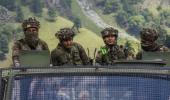India and China have reached an agreement on disengagement in the North and South bank of Pangong lake in eastern Ladakh that mandates both sides to cease forward deployment of troops in a "phased, coordinated and verifiable" manner, Defence Minister Rajnath Singh announced in Parliament on Thursday, in a breakthrough after a nine-month border standoff.

Sharing details of the pact to defuse the tense military face-off in eastern Ladakh that severely strained ties between the two Asian giants, Singh also assured the Rajya Sabha that India has not conceded anything in the sustained talks with China. India will not allow even an inch of its territory to be taken by anyone, he said.
The defence minister said implementation of the pact will "substantially restore" the situation to the one which existed prior to the standoff that erupted on May 5 last, adding the two sides have agreed they should achieve complete disengagement at the "earliest" and abide fully by the bilateral agreements and protocols.
Making a statement in the Upper House a day after China announced the disengagement process, Singh said both sides have agreed to remove structures that had been built since April last in North and South bank areas, and put in place a temporary moratorium on military activities including patrolling the traditional areas.
The defence minister said under the agreement the Chinese People's Liberation Army will keep its troops in the North bank area to east of Finger 8 and the Indian troops will be based at their permanent base at Dhan Singh Thapa Post near Finger 3 in the Pangong lake areas, a major site of friction between the two large armies.
He said the implementation of the pact started on Wednesday and it was agreed to convene the next meeting of senior commanders of both sides within 48 hours of completion of the disengagement in the Pangong lake area so as to resolve all other remaining issues.
"I am happy to inform the House today that as a result of our well thought out approach and sustained talks with the Chinese side, we have now been able to reach an agreement on disengagement in the North and South bank of the Pangong lake," the defence minister said.
The border standoff between the Indian and Chinese militaries erupted on May 5 following a violent clash in the Pangong lake areas and both sides gradually enhanced their deployment by rushing in tens of thousands of soldiers as well as heavy weaponry even as the two sides continued military and diplomatic talks.
"The agreement that we have been able to reach with the Chinese side for disengagement in the Pangong lake area envisages that both sides will cease their forward deployments in a phased, coordinated and verified manner."
"The Chinese side will keep its troop presence in the North bank area to east of Finger 8. Reciprocally, the Indian troops will be based at their permanent base at Dhan Singh Thapa post near Finger 3. A similar action would be taken in the South bank area by both sides," he said.
The defence minister said patrolling will be resumed in the areas only when both sides reach an agreement in diplomatic and military talks that would be held subsequently.
He said these are mutual and reciprocal steps and any structures that had been built by both sides since April 2020 in both North and South bank areas will be removed and the landforms will be restored.
"I want to assure this House that in these talks we have not conceded anything. The House should also know that there are still some outstanding issues with regard to deployment and patrolling at some other points along the Line of Actual Control in eastern Ladakh," he said.
"These will be the focus of further discussions with the Chinese side. We have agreed that both sides should achieve complete disengagement at the earliest and abide fully by the bilateral agreements and protocols."
Noting that the Chinese side is fully aware of India's resolve by now, he said it is India's expectation that the neighbouring country will work with the Indian side in full sincerity to resolve these remaining issues.
"I would like this House to join me in paying gratitude to our armed forces who have shown grit and resolve under these extremely harsh climatic conditions of Ladakh which has resulted in the present agreement," he said.
“Our nation will always remember the sacrifices made by our brave soldiers which have been the foundation of this disengagement at Pangong Tso lake."
The defence minister exuded confidence that the entire House, irrespective of political affiliations, is united together for upholding the country's "sovereignty, unity, territorial integrity and national security".
"And further, this House is one in sending out the same message demonstrating the strength and unity of our Nation to the entire world," he said.
In the nine rounds of military talks, India had specifically insisted on withdrawal of Chinese troops from Finger 4 to Finger 8 on the North bank of Pangong Lake. The mountain spurs in the area are referred to as Fingers.
On its part, the Chinese side was insisting on withdrawal of Indian troops from several strategic peaks on the southern bank of the lake. Around five months back, Indian troops occupied a number of strategic heights in the Mukhpari, Rechin La and Magar hill areas around the southern bank after the Chinese PLA attempted to intimidate them in the area.
China on Wednesday said the Chinese and Indian frontline troops at the southern and northern bank of the Pangong Tso started "synchronised and organised disengagement" from February 10 in accordance with the consensus reached by both sides at the ninth round of China-India Corps Commander- Level meeting. The ninth round was held on January 24 and it lasted for around 16 hours.
Both sides had rushed a large number of battle tanks, armoured vehicles and heavy equipment to the treacherous and high-altitude areas of eastern Ladakh region after tension escalated following a deadly clash in the Galwan Valley in June last.
Twenty Indian soldiers were killed in the fierce hand-to-hand combat on June 15 in Galwan Valley, an incident that marked the most serious military conflicts between the two sides in decades.
China is yet to disclose the number of its soldiers killed and injured in the clash though it officially admitted to have suffered casualties. According to an American intelligence report, the number of casualties on the Chinese side was 35.










